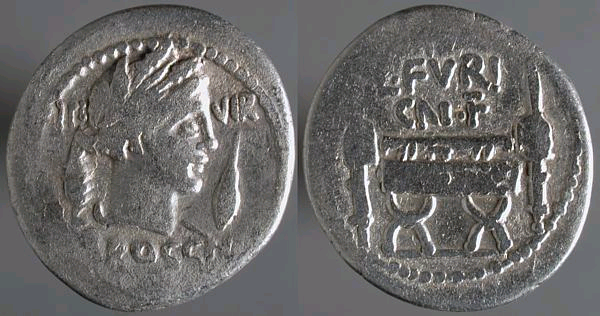![[Loyola University Chicago]](http://www.luc.edu/images/loyola.gif) |
LATN 281/332: Sallust
Spring Semester 2008
|

|
An Italian who crossed the high threshold into Roman office, a well-connected
player, an unsuccessful military leader, an exploitative provincial governor, an
idiosyncratic stylist, a pungent judge of all that stank in Roman politics and
policy - Sallust points the way to a critical investigation of late-Republican
government and historiography.
Our work together will pursue three main aims (plus the fourth, of
having fun with them):
- Inquiring and studying, to gain knowledge of Sallust's language, his literary
and historical context, his historiographical techniques, and the subjects he addressed
in his monographs of Roman crisis, the Bellum
Catilinae and Bellum Iugurthinum
- Analyzing and synthesizing, to build facility in reading Latin and appreciating
its communication
- Thinking critically, to investigate, generate, test, and advance theories about
how Sallust used information and rhetoric to interpret Roman political culture
TTh 8:30-9:45 AM
Crown Center 572 --NEW LOCATION--
Dr. Jacqueline Long
Office Hours
TTh 11:15am-12:00noon, Crown Center 579; or by appointment
Crown Center 579
773-508-3654
jlong1@luc.edu
Texts
- Required: J. T. Ramsey, ed., Sallust's Bellum Catilinae, 2nd edn., Oxford
University Press 2007
- Required: S. A. Handford, tr., Sallust: The Jugurthine War, the Conspiracy of
Catiline, Penguin Classics 1964 & rpt.
- Recommended: J. H. Allen et al., Allen & Greenough's New Latin Grammar,
Dover Books 2006;
Allen
& Greenough On-Line is available thanks to the
Perseus Project
- Recommended: Charlton T. Lewis, ed., An Elementary Latin Dictionary,
Oxford University Press 1969 & rpt.; alternatively,
Lewis & Short
On-Line, is available from the Perseus Project
Policies and Assessment
Schedule of Reading Assignments and Topics
Internet resources
Specially for this course
- Text of
Sallust, Bellum Catilinae, on-line from The
Latin Library. It doesn't include commentary, so it's no substitute for the
required text, but it's a resource when you need a quick look at the Latin.
- Gaius
Sallustius Crispus, reprinted in its entirety from Jared W. Scudder, ed.,
Sallust's Catiline, "Introduction," Boston: Allyn & Bacon 1900, by the
UAH Society
for Ancient Languages
- Substantive-hunt grid: model for analyzing Latin syntax.
- Verb-hunt grid: model for analyzing Latin syntax.
Resources for Latin
- Allen
& Greenough (also a recommended text, in print) is a good reference grammar on-line.
Consult its sections on forms and syntax as
often as the mood strikes you - they're always worth knowing. Scroll down
the Table of Contents to which this link takes you, and click on the link for each
item you wish to consult. Part of the Perseus Project.
- Lewis & Short On-Line
offers look-up access to a detailed reference dictionary.
Type in the character string for which you wish to search (preferably,
the dictionary-entry form of the word you want) and "submit query".
Warning! This page was initially set up
for people working with Greek, so many of its directions and responses
will come to you in terms of Greek words and transliterations. Do not
be alarmed! Your instructor will endeavor to help unsnarl any
confusions: just ask. Another helpful part of the
Perseus Project.
- Early Roman Calendar,
an overview presented by Calendars
through the Ages.
- Nuntii Latini offers current news briefs
in Latin. Produced by FYI, the Finnish Broadcasting Company, edited by Professor Emeritus Tuomo
Pekkanen and Docent Reijo Pitkäranta of Helsinki University.
- latin.wunderground.com offers weather reports
in Latin. Produced by The Weather Underground, Inc..
Resources on Roman culture
- The
Roman Constitution, reprinted in its entirety from J. B. Greenough & G. L. Kittredge, edd.,
Select Orations and Letters of Cicero, "Introduction VI," Boston: Ginn and Company 1902, by the
UAH Society
for Ancient Languages
- Roman
Oratory, reprinted in its entirety from J. B. Greenough & G. L. Kittredge, edd.,
Select Orations and Letters of Cicero, "Introduction II," Boston: Ginn and Company 1902, by the
UAH Society
for Ancient Languages
- Perseus Project:
an evolving digital library for the study of the Greek and Roman worlds.
- Lacus
Curtius, a treasurehouse of on-line resources for just about everything conceivably
relating to Roman archaeology, compiled by Bill Thayer.

Revised 16 January 2008 by
jlong1@luc.edu
http://www.luc.edu/classicalstudies/
![[Loyola University Chicago]](http://www.luc.edu/images/loyola.gif)

![[Loyola University Chicago]](http://www.luc.edu/images/loyola.gif)

